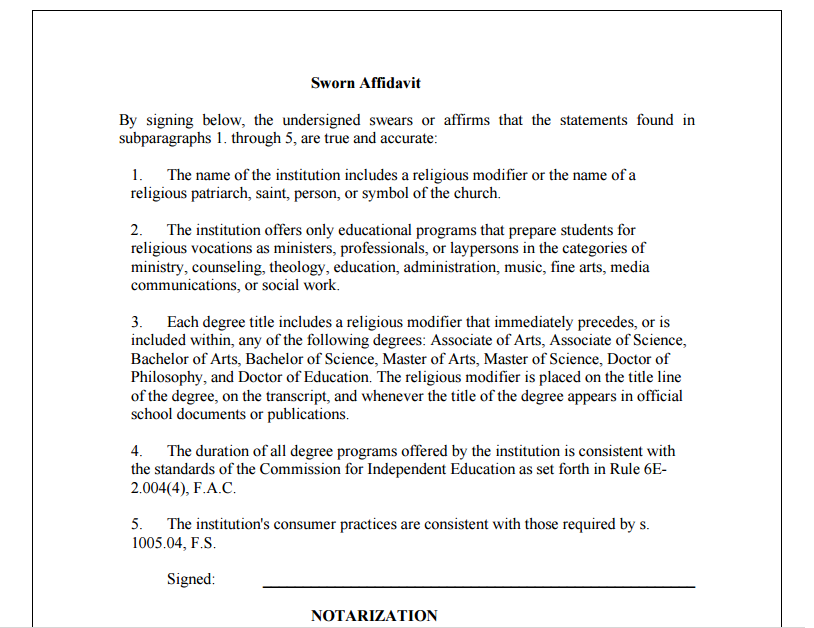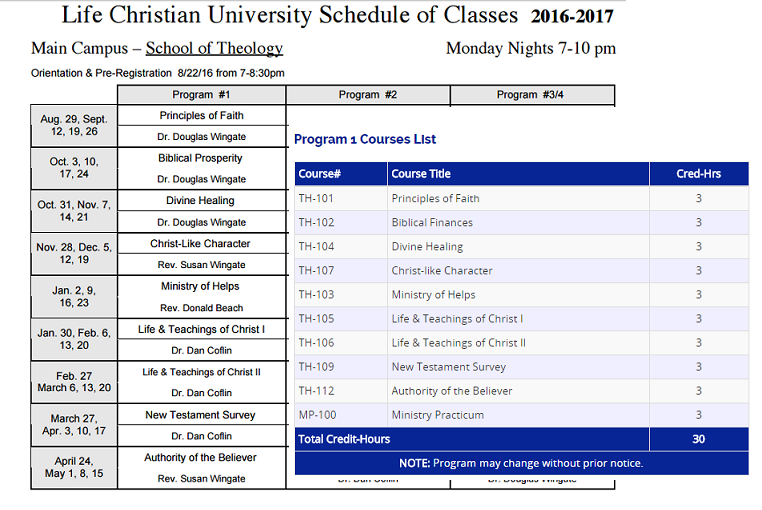As a religious school in Florida, Life Christian University is not required to obtain a license from the FL Commission on Independent Education if the school adheres to five requirements. Each year, exempt schools must file a sworn affidavit to the Commission and if accepted, the Commission will issue an exemption letter. According to the Commission website, LCU has received a letter of exemption.
Having reviewed the state requirements and LCU’s website and materials, I am of the opinion that the Commission should reconsider the exemption.
First, the requirements for an exemption are spelled out in FL Form 113 – Application for Religious Institution Letter of Exemption. One may also review these in FL law. In chapter 1005 of the FL statutes, rules are spelled out for colleges not under the jurisdiction of the Commission. The section on religious colleges (1005.06 – 1.f) begins: “A religious college may operate without governmental oversight if the college annually verifies by sworn affidavit to the commission that…” See the image below for the requirements:

LCU clearly conforms with points 1 and 2. The school name has a religious modifier and the programs are religious in nature. LCU appears to meet the requirements in point 3. However, I cannot verify this since I have not seen transcripts or any of the diplomas up close. In the pictures of “distinguished degree holders” and David Barton’s video, it is not clear how the degrees are labeled.
LCU does not appear to meet the requirements of points 4 and 5. The rest of the post provides evidence for my opinion.
Duration of Degree Programs
LCU’s course schedule for 2016-2017 lays out the schedule Bachelor’s students are expected to follow for the first years. The fourth year allows some flexibility for specialization. Each year is the same in that 9 three credit hour courses are required along with a three hour practicum experience to make up a total of 30 semester hours. At the end of four years, student following the program accumulate 120 credits to graduate with a Bachelor’s degree.
Classes are held in three hour blocks on Monday nights. Three credits are awarded for 12 clock hours of class time. LCU’s website spells it out.
What are the course requirements?
Each 3-credit-hour course meets for 3 clock-hours once per week. Over a period of 4 weeks, the required 12 clock-hours of class time is accumulated. You should allow for at least two 10-minute breaks during each 3-hour class session.

According to LCU’s course schedule, it only takes four weeks of meeting three hours/week to complete 3 semester hours. This means that each credit requires only 4 hours of class time. In the image above, one can see that students attend school three hours on Monday night and take one class at a time. Students are credited with 3 semester hours for those 12 hours of attendance. As I will demonstrate, this is significantly less than state law requires. According to point 4 in the law, even exempt schools must match degree duration requirements.
According to the affidavit (see above), the rules for degree duration are detailed in the FL Administrative Code Rule 6E-2.004(4).
The duration of all degree programs offered by the institution is consistent with the standards of the Commission for Independent Education as set forth in Rule 6E- 2.004(4), F.A.C.
Section 4 of Rule 6E-2.004 is a long section dealing with the requirements for licensed colleges under the Commission. According to the affidavit, the only applicable standard for a religious school is that the duration of degrees is consistent with these guidelines. The rules lay out guidelines for associates degrees through doctorates. For our purposes, I will focus on the Bachelor’s degree. Here are the guidelines for an acceptable Bachelor’s degree.
(p) The following instructional program standards apply to bachelor’s degrees: 1. Program specifications: The credential offered shall be the Bachelor of Science Degree, Bachelor of Arts Degree, or other baccalaureate degree title considered by the Commission to be appropriate and not misleading. The duration of the program shall be a minimum of 120 semester credit hours, 180 quarter credit hours, or the recognized clock hour equivalent. The required general education component for a Bachelor of Science degree shall be a minimum of 30 semester credit hours, 45 quarter credit hours, or the recognized clock hour equivalent. The required general education component for the Bachelor of Arts degree shall be a minimum of 45 semester credit hours, 67.5 quarter credit hours, or the recognized clock hour equivalent. The general education requirements for other bachelor’s degrees shall be appropriate to the specific degree. Applied general education shall not be utilized to fulfill this requirement. All general education courses must meet the definition given in subsection 6E-1.003(38), F.A.C. Unless otherwise required by the accrediting agency, a minimum of 15 of the required general education credit hours or the recognized clock hour equivalents must be obtained at the bachelor’s level.
In bold print above, the duration for a Bachelor’s degree is specified as 120 semester credit hours, 180 quarter hours or the recognized clock hour equivalent. LCU does require 120 credit hours but those credits do not meet state guidelines for a semester hour. For the state definition of a semester credit hour, we go to definitions section of Rule 6E (page 4 of the linked document)
(55) “Semester Credit Hour” means either:
(a) A unit consisting of a minimum of fifteen hours of instruction appropriate to the level of credential sought, during a semester, plus a reasonable period of time outside of instruction which the institution requires a student to devote to preparation for learning experiences, such as preparation for instruction, study of course material, or completion of educational projects; or
(b) Planned learning experiences equivalent to the learning and preparation described in paragraph 6E-1.003(55)(a), F.A.C., above, as determined by duly qualified instructors responsible for evaluating learning outcomes for the award of credits.
Section 55(b) may be a loophole for LCU. However, according to the LCU FAQs, students only have to read at minimum 250 pages per course (less than most textbooks) and do four papers in an entire year. I think 55(b) is meant to include independent studies which are normally conducted outside of a formal classroom but are “equivalent” to the 15 clock hours of instruction described in section 55(a).
Florida’s duration requirement for one semester credit hour is 15 clock hours. LCU requires 12 clock hours to receive 3 credits which comes out to 4 clock hours per semester credit hour. LCU students are scheduled for 108 clock hours/year which comes out to 7.2 semester credit hours/year. Adding in the 3 semester credit hour practicum and students are getting the equivalent of just over 10 semester credit hours/year. At that pace, it could take about 12 years to complete a degree using state degree duration guidelines.
I don’t think LCU should swear that they meet the state’s degree duration requirements.
Consumer Practices and Advertising
Point five in the affidavit is:
The institution’s consumer practices are consistent with those required by s1005.04 in FL law.
That section is reproduced here:
1005.04 Fair consumer practices.—
(1) Every institution that is under the jurisdiction of the commission or is exempt from the jurisdiction or purview of the commission pursuant to s. 1005.06(1)(c) or (f) and that either directly or indirectly solicits for enrollment any student shall:
(a) Disclose to each prospective student a statement of the purpose of such institution, its educational programs and curricula, a description of its physical facilities, its status regarding licensure, its fee schedule and policies regarding retaining student fees if a student withdraws, and a statement regarding the transferability of credits to and from other institutions. The institution shall make the required disclosures in writing at least 1 week prior to enrollment or collection of any tuition from the prospective student. The required disclosures may be made in the institution’s current catalog;
(b) Use a reliable method to assess, before accepting a student into a program, the student’s ability to complete successfully the course of study for which he or she has applied;
(c) Inform each student accurately about financial assistance and obligations for repayment of loans; describe any employment placement services provided and the limitations thereof; and refrain from promising or implying guaranteed placement, market availability, or salary amounts;
(d) Provide to prospective and enrolled students accurate information regarding the relationship of its programs to state licensure requirements for practicing related occupations and professions in Florida;
(e) Ensure that all advertisements are accurate and not misleading;
(f) Publish and follow an equitable prorated refund policy for all students, and follow both the federal refund guidelines for students receiving federal financial assistance and the minimum refund guidelines set by commission rule;
(g) Follow the requirements of state and federal laws that require annual reporting with respect to crime statistics and physical plant safety and make those reports available to the public; and
(h) Publish and follow procedures for handling student complaints, disciplinary actions, and appeals.
(2) In addition, institutions that are required to be licensed by the commission shall disclose to prospective students that additional information regarding the institution may be obtained by contacting the Commission for Independent Education, Department of Education, Tallahassee. History.—s. 247, ch. 2002-387; s. 45, ch. 2004-41.
Since I am not privy to all of the materials given to students or professors, I can only evaluate letter (e). Given what I have learned about their degree duration, I don’t think LCU reasonably passes that standard.
One problem is labeling honorary doctorates as “earned degrees.” The degrees LCU has given to “big name preachers” who did not even attend cannot be considered earned.
LCU’s self-description is quite misleading:
LCU is rapidly becoming known as one of the premiere ministry universities in the world. With its quality program, miraculous growth rate and great number of prominent and distinguished ministers who have chosen LCU for recognition of their academic work, a degree from LCU is one of the most prestigious degrees available.
Given the fact that the school doesn’t meet the state degree duration requirements, the following self-description is especially misleading:
Meeting & Exceeding State Requirements
Life Christian University has fulfilled rigorous educational requirements in our determination to acquire and maintain a quality educational program. LCU is a state-authorized school, recognized by the Florida Department of Education’s Commission for Independent Education, having fully met and exceeded the requirements of state law. Additionally, in each of the many states where LCU has campuses, we have met and exceeded the requirements of their State Departments of Education as well.
According to the rule above, LCU should explain that the school is exempt from most requirements and is not licensed. Clearly, the school does not meet the requirements of state law when it comes to amount of instruction required to assign semester credit hours.
Finally, for IRS purposes, LCU is a church and exempt from the requirement to file a 990 form. Perhaps this is common with unaccredited schools, but there is no hint in any of the educational materials I have seen that LCU is a church. This too seems misleading.
In a future post, I plan to discuss the accrediting body used by LCU.
Previous posts regarding LCU:
Is David Barton’s PhD from Life Christian University?
David Barton Removed His PhD Video
Life Christian University’s Distinguished Degree Holders Did Not Attend the School

